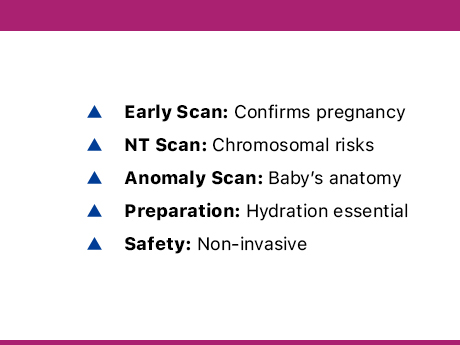
Purpose and Process of Scans During Pregnancy
Pregnancy is a journey filled with milestones, and fetal scans are among the most significant. These scans not only give expectant parents a glimpse of their growing baby but also provide crucial insights into the baby’s health and development. Understanding the purpose and process of scans during pregnancy can help parents feel more prepared and confident about their journey. This guide offers a comprehensive look at what you can expect during a fetal scan, how to prepare, and the key scans performed at different stages of pregnancy.The Importance of Fetal Scans During Pregnancy:
Fetal scans, commonly referred to as pregnancy ultrasounds, are non-invasive imaging techniques that use sound waves to create detailed images of the developing fetus. These scans help monitor:
- The baby’s growth and development.
- Placental health and position.
- Amniotic fluid levels.
- Early detection of potential complications.
Facilities offering a pregnancy ultrasound near me provide tailored care to ensure a smooth and informed pregnancy journey.
Types of Fetal Scans:
Several scans are conducted at different stages of pregnancy, each serving a specific purpose.
- Early Pregnancy Scan (Fetal Viability Scan):
- Performed between 6–9 weeks.
- Confirms the pregnancy and checks the fetal heartbeat.
- Determines the baby’s location and viability.
- Nuchal Translucency (NT) Scan:
- Conducted around 11–14 weeks.
- Measures fluid at the back of the baby’s neck to assess the risk of chromosomal conditions like Down syndrome.
- Combined with blood tests for accurate results.
- Anomaly Scan:
- Performed between 18–22 weeks.
- Examines the baby’s organs, limbs, and overall anatomy.
- Checks for congenital anomalies and placental placement.
- Growth and Doppler Scans:
- Conducted in the third trimester.
- Tracks the baby’s growth and blood flow in the umbilical cord and placenta.
Each of these scans provides critical information, ensuring the health and well-being of both mother and baby.
Preparing for Fetal Scan:
Being well-prepared can make your scan experience smooth and stress-free. Here’s how you can get ready:
- Hydration:
Drink plenty of water before your scan, as a full bladder helps create clearer images, especially during early scans.
- Comfortable Clothing:
Wear loose, comfortable clothing that allows easy access to your abdomen.
- Questions:
Prepare any questions you may have for your healthcare provider about your baby’s development.
- Emotional Readiness:
Scans can be emotional experiences. Take a moment to relax and enjoy this special connection with your baby.
With proper preparation, you can make the most of your pregnancy ultrasounds and address any concerns with your healthcare team.
What Happens During a Fetal Scan?
Understanding the scan process can ease any nervousness you might feel:
- Arrival and Setup:
- The technician applies a gel to your abdomen to enhance the ultrasound’s efficiency.
- A handheld transducer moves across your belly to capture images.
- Image Capture and Analysis:
- Real-time images of your baby appear on a monitor.
- The technician checks for specific markers based on the scan type.
- Discussion:
- After the scan, the results are reviewed with your doctor, who explains the findings.
The process is painless and allows parents to witness their baby’s movements and development, a moment of joy for many.
Key Benefits of Fetal Scans:
Fetal scans are more than just a glimpse of your baby; they serve critical medical purposes:
- Early Detection: Identifies issues early for timely intervention.
- Reassurance: Provides parents with peace of mind about their baby’s health.
- Monitoring Development: Tracks growth milestones and placental health.
- Personal Connection: Offers parents a chance to bond with their baby.
With advanced technology available at facilities like The Garbh, scans are precise, safe, and informative.
The Role of Anomaly and Nuchal Scans:
Both anomaly scan and nuchal scan play pivotal roles in identifying potential health concerns:
- Anomaly Scan: Assesses the baby’s anatomical structure and detects conditions like spina bifida or heart defects.
- Nuchal Scan: Measures neck translucency to evaluate chromosomal abnormalities.
These scans offer essential data that guide your healthcare provider in creating an optimal care plan for your pregnancy.
How to Choose the Right Facility for Fetal Scans?
Selecting a trusted healthcare provider is vital for accurate results and a positive experience. Look for:
- Expertise in fetal medicine.
- State-of-the-art ultrasound equipment.
- Comprehensive services, including fetal viability scan and advanced diagnostics.
- Compassionate care tailored to your needs.
The Garbh stands out as a center of excellence, providing expert care and advanced facilities for all scans during pregnancy.
Conclusion!
Fetal scans are a crucial aspect of prenatal care, offering vital insights into your baby’s health and development. By understanding what to expect and adequately preparing for fetal scan, you can approach these milestones with confidence and joy. From early viability checks to detailed anomaly scans, each step ensures a safe and informed pregnancy.
Embrace every milestone of your pregnancy with confidence. At The Garbh, we combine compassionate care and advanced technology to ensure your journey is seamless and memorable. Book your pregnancy ultrasound near me today and take the next step toward a healthy and happy pregnancy. Your little miracle deserves the best start!
Frequently Asked Questions:
What is the purpose of a fetal viability scan?
Ans. It confirms the pregnancy, checks the fetal heartbeat, and determines the baby’s viability.
When is the anomaly scan performed?
Ans. The anomaly scan is conducted between 18–22 weeks to assess the baby’s anatomy and detect potential abnormalities.
How do I prepare for a pregnancy ultrasound?
Ans. Drink plenty of water for a clearer image, wear comfortable clothing, and bring any relevant medical records.
What is a nuchal scan?
Ans. A nuchal scan measures neck translucency between 11–14 weeks to evaluate the risk of chromosomal abnormalities.
Are fetal scans safe for the baby?
Ans. Yes, fetal scans use non-invasive ultrasound technology, which is safe for both mother and baby.


